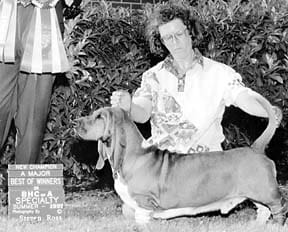When our grandparents (or perhaps great-grandparents) were children, it was not uncommon for people to have big families – say, eight or 10 or more kids – but to have only a few survive due to childhood diseases, a lack of modern medical care, and, sometimes, poor nutrition.
This is a story of Dusty, a dog with just such a background; he is the sole survivor from a litter of 11 puppies. But despite being born in modern times, superior medical care and technology failed to save Dusty’s siblings. Sometimes, Dusty’s story shows us, it takes luck (what our grandparents had), advanced medical care (what most of us have access to today), AND non-traditional care and treatments to cure what ails us.

A bad start
By the time Dusty’s mother, Karma, had delivered her first three puppies, 2 a.m. had come and gone. A fourth puppy seemed to be stuck in the birth canal, and it was evident from Karma’s belly that more pups were waiting for their turn to enter the world. Gretchen Shelby, Karma’s owner, found herself calling her veterinarian and rushing the distressed dog and her puppies to an emergency veterinary clinic.
Unfortunately, even with the best efforts of the attending veterinarian, Karma died on the surgery table. She was just under two years old. The veterinarian completed the emergency cesarean section and delivered another seven puppies for a total of 11.
Shelby, a long-time dog breeder and exhibitor, knew what would be required to save the puppies. She called a number of breeders she knew and found a foster mother to nurse the puppies, and bought some milk replacer, in case the foster mother could not supply the amount needed by he large brood. She also divided her family members into teams to “baby-sit” in the nursery for the first few days.
All went well for about a week, when two pups abruptly quit eating and started crying frequently. Shelby’s veterinarian administered fluids, and the puppies improved immediately, but then, just as quickly, went on a downhill slide. After 48 hours of crying, vomiting, difficult excretion, and repeated visits to the veterinarian, the two pups died within an hour of each other. Within days, two more started behaving in the same manner, and then several more. At two weeks of age, only four puppies from the litter, Dusty included, still survived.
Shelby spent her days on the phone, asking everyone she knew for advice. One dog show acquaintance and fellow Basset breeder, Marina Zacharias, gave her a homeopathic preparation called “Fading Puppy Remedy.” Though she had no experience with using any kind of non-traditional treatments, Shelby administered the remedy to the remaining pups. It didn’t miraculously cure the puppies, but on the other hand, none of the four got any worse in that time period. It was something to think about.
Referral to a specialist
Unfortunately, there was a lot to think about. Shelby’s regular veterinarian was mystified by the puppies’ condition. He directed Shelby to a clinic equipped with more diagnostic and laboratory equipment. She duly drove the puppies and the foster mother to Portland, to see Dr. Robert Franklin at the Veterinary Referral Clinic.
Dr. Franklin surmised that, while pregnant, poor Karma had acquired a bacterial infection that contributed to her demise, and that was evidenced in the pups.
“Tissues of a developing fetus are susceptible to an infection process in utero, a process that can sometimes lead to compromised organ function in the offspring postpartum,” Dr. Franklin explains. Lab tests brought to light further challenges: the puppies’ adrenal function was zip, and the puppies’ kidneys were barely functioning.
Aggressive conventional medical intervention seemed to save the day. Franklin administered prednisone, fluids, and other medications to the puppies, and instructed Shelby in the art of administering fluids via IV catheter. He sent the puppies home in a car piled high with supplies for at-home treatment. Given a diagnosis explaining the tragedies thus far, all concerned were optimistic about the puppies’ future.
Three weeks later, the pups were all flourishing. Follow-up blood tests showed the puppies’ kidney function to be normal, but Shelby was warned to remain cautious, as any or all of the pups could still show up kidney compromised later.
At 12 weeks, with yet another blood test confirming proper kidney function, Shelby placed two of the puppies (the two with the best results on their blood tests) with families, keeping the two with the lesser kidney function values. The families knew their puppies’ medical histories, and agreed to re-test each pup at six months of age.
Another death
At seven months, another death struck Karma’s babies. “Moses,” one of the puppies that Shelby had given to a family died shortly after his family returned from an extended vacation, despite last-minute medical intervention. Shelby was frustrated, because it seemed that if the family had responded more quickly to the young dog’s symptoms (increased urination, increased thirst, decreased appetite and lethargy), a veterinarian could have saved him.
Moses’ death by what was surely kidney failure galvanized Shelby, who ordered blood tests for the three remaining offspring. Sadly, all three showed definite kidney damage. Conventional veterinary wisdom held that until a crisis occurred, the owners could do nothing for the dogs other than feed a prescription kidney diet.
Shelby put everything that Dr. Franklin suggested into practice, but she was frustrated, feeling that perhaps she could be doing more. She decided to seek further help from her friend Zacharias, who had come forward with the “Fading Puppy” remedy. Since Dusty had the worst blood values of the three puppies, Shelby decided to use him as a sort of guinea pig to test the potential benefits of holistic medicine. She followed all the veterinarian’s suggestions for Promise, including putting the female puppy on Hills’ K/D (kidney diet), and let Zacharias make the decisions for Dusty’s care.
A “holistic” experiment
Zacharias, a certified homotoxicologist and NAET practitioner from Jacksonville, Oregon, suggested that Dusty be put on an aggressive holistic regimen that included an advanced “kidney” diet.
“It’s not just the amount of protein that could be harmful to a kidney compromised animal, but the quality, too,” comments Zacharias. “Commercial foods often contain inferior protein sources, so you should really check out what ingredients are actually contained in the food you buy.”
This approach was endorsed by Dr. Franklin, who concurs that “Nutrition is key in animal health, and especially in those functionally compromised. Homemade diets to accommodate kidney dysfunction can be beneficial.”
Zacharias based Dusty’s diet on a quality dry senior food diet low in protein (“Nature’s Recipe Senior”), generously augmented with fresh, wholesome foods. She would have preferred for Shelby to feed a completely homemade diet, but, being new to holistic care and lacking proof that all the fuss would pay off, Shelby was not quite ready for that kind of involvement. Dusty also received several glandular supplements to lend specific support to the kidneys, adrenal, gonad, and pituitary functions, and a liver supplement, since, as Zacharias says, “You really have to think of the liver when you’re considering support for the kidneys.” Homeopathic remedies, also played a role. “We give our kidney cases some specialty homeopathics from Germany that are a crucial part in achieving success in kidney failure cases,” says Zacharias.
At about this time, with the onset of winter, “Cupcake,” the other puppy that Shelby had given away, began to decline. Despite veterinary intervention, her kidneys began to fail, and her family had her put to sleep.
A few months later, despite Promise’s initially better condition, she began to decline. Tests confirmed that her kidneys were failing. Since Dusty was still doing well, Shelby began giving Promise all the supplements that Dusty was receiving. Dr. Franklin changed her diet, and added other supplements, which seemed to buy her a little time. However, she, too, eventually died, at just a year and a half old.
Devotion to Dusty
Promise’s death underscored the importance of Dusty’s top-quality diet and supplements, as well as the effectiveness of the holistic approach. Shelby had Dusty’s blood tested every three months, and every panel indicated his kidneys were functioning well.
As time went by and Dusty seemed to maintain good health, Shelby began showing the handsome Basset. She kept a close eye on his every symptom for fear that the stress of training and showing might upset his system. But Dusty continued to thrive as he worked steadily toward his AKC championship.
Today, at three and a half years old, Dusty is an AKC Champion – and a father! He’s begun a career at stud, and Shelby was thrilled to see his first progeny looking just like him.
Shelby has enjoyed several victories with her favorite dog, including a large specialty Best Puppy in Sweepstakes, Winner’s Dog, and Best of Winners at the Basset Hound Club of America’s Western Regional Specialty Show. She is also a strong believer in using the best of non-traditional therapies in conjunction with traditional veterinary medicine. The approach takes lots of extra time and trouble, she says, but it’s worth it.
“I will never gripe about the number of pills and treatments I’ve given Dusty. It’s all been worth it! Each day is a gift I cherish with this loving dog,” she says.
-By Susan Eskew
Writer Susan Eskew, of Crested Butte, Colorado, is a frequent contributor to WDJ.
Marina Zacharias can be reached in Jacksonville, Oregon at (541) 899-2080.





